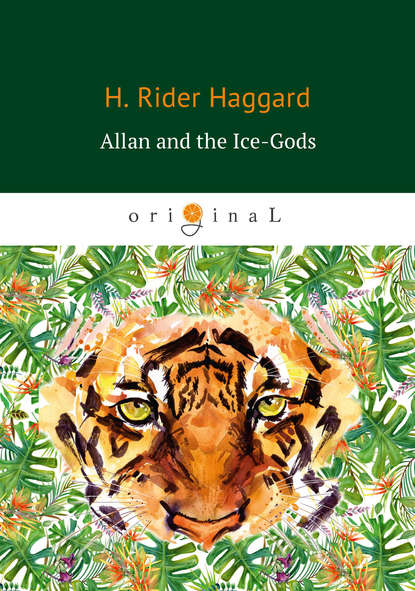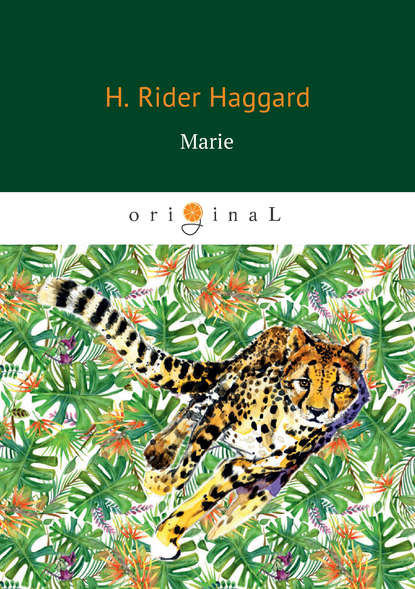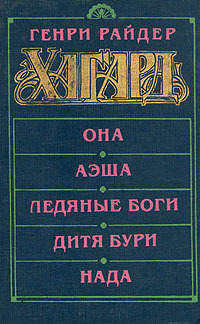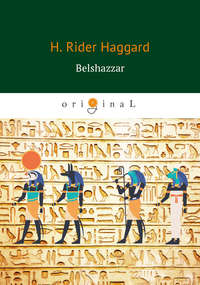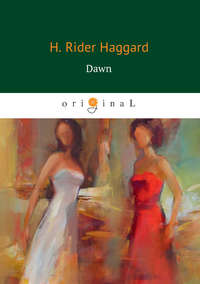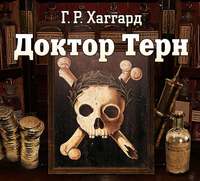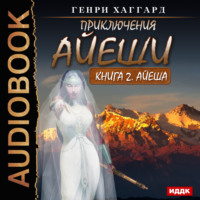
Полная версия
Child of Storm & Magepa the Buck
“O Macumazana,” said Umbezi in a hoarse whisper, “might it not perhaps be as well to leave her alone? If she bled to death, at any rate she would be quieter.”
“Are you a man or a hyena?” I answered sternly, and set about the job, Scowl holding the poor woman’s head between his knees.
It was over at length; a simple operation in which I exhibited – I believe that is the medical term – a strong solution of caustic applied with a feather.
“There, Mother,” I said, for now we were alone in the hut, whence Scowl had fled, badly bitten in the calf, “you won’t die now.”
“No, you vile White Man,” she sobbed. “I shan’t die, but how about my beauty?”
“It will be greater than ever,” I answered; “no one else will have an ear with such a curve in it. But, talking of beauty, where is Mameena?”
“I don’t know where she is,” she replied with fury, “but I very well know where she would be if I had my way. That peeled willow-wand of a girl” – here she added certain descriptive epithets I will not repeat – “has brought this misfortune upon me. We had a slight quarrel yesterday, White Man, and, being a witch as she is, she prophesied evil. Yes, when by accident I scratched her ear, she said that before long mine should burn, and surely burn it does.” (This, no doubt, was true, for the caustic had begun to bite.)
“O devil of a White Man,” she went on, “you have bewitched me; you have filled my head with fire.”
Then she seized an earthenware pot and hurled it at me, saying, “Take that for your doctor-fee. Go, crawl after Mameena like the others and get her to doctor you.”
By this time I was half through the bee-hole of the hut, my movements being hastened by a vessel of hot water which landed on me behind.
“What is the matter, Macumazahn?” asked old Umbezi, who was waiting outside.
“Nothing at all, friend,” I answered with a sweet smile, “except that your wife wants to see you at once. She is in pain, and wishes you to soothe her. Go in; do not hesitate.”
After a moment’s pause he went in – that is, half of him went in. Then came a fearful crash, and he emerged again with the rim of a pot about his neck and his countenance veiled in a coating of what I took to be honey.
“Where is Mameena?” I asked him as he sat up spluttering.
“Where I wish I was,” he answered in a thick voice; “at a kraal five hours’ journey away.”
Well, that was the first I heard of Mameena.
That night as I sat smoking my pipe under the flap lean-to attached to the wagon, laughing to myself over the adventure of “the Old Cow,” falsely described as “worn out,” and wondering whether Umbezi had got the honey out of his hair, the canvas was lifted, and a Kafir wrapped in a kaross crept in and squatted before me.
“Who are you?” I asked, for it was too dark to see the man’s face.
“Inkoosi,” answered a deep voice, “I am Saduko.”
“You are welcome,” I answered, handing him a little gourd of snuff in token of hospitality. Then I waited while he poured some of the snuff into the palm of his hand and took it in the usual fashion.
“Inkoosi,” he said, when he had scraped away the tears produced by the snuff, “I have come to ask you a favour. You heard Umbezi say to-day that he will not give me his daughter, Mameena, unless I give him a hundred head of cows. Now, I have not got the cattle, and I cannot earn them by work in many years. Therefore I must take them from a certain tribe I know which is at war with the Zulus. But this I cannot do unless I have a gun. If I had a good gun, Inkoosi – one that only goes off when it is asked, and not of its own fancy, I who have some name could persuade a number of men whom I know, who once were servants of my father, or their sons, to be my companions in this venture.”
“Do I understand that you wish me to give you one of my good guns with two mouths to it (i.e. double-barrelled), a gun worth at least twelve oxen, for nothing, O Saduko?” I asked in a cold and scandalised voice.
“Not so, O Watcher-by-Night,” he answered; “not so, O He-who-sleeps-with-one-eye-open” (another free and difficult rendering of my native name, Macumazahn, or more correctly, Macumazana) – “I should never dream of offering such an insult to your high-born intelligence.” He paused and took another pinch of snuff, then went on in a meditative voice: “Where I propose to get those hundred cattle there are many more; I am told not less than a thousand head in all. Now, Inkoosi,” he added, looking at me sideways, “suppose you gave me the gun I ask for, and suppose you accompanied me with your own gun and your armed hunters, it would be fair that you should have half the cattle, would it not?”
“That’s cool,” I said. “So, young man, you want to turn me into a cow-thief and get my throat cut by Panda for breaking the peace of his country?”
“Neither, Macumazahn, for these are my own cattle. Listen, now, and I will tell you a story. You have heard of Matiwane, the chief of the Amangwane?”
“Yes,” I answered. “His tribe lived near the head of the Umzinyati, did they not? Then they were beaten by the Boers or the English, and Matiwane came under the Zulus. But afterwards Dingaan wiped him out, with his House, and now his people are killed or scattered.”
“Yes, his people are killed and scattered, but his House still lives. Macumazahn, I am his House, I, the only son of his chief wife, for Zikali the Wise Little One, the Ancient, who is of the Amangwane blood, and who hated Chaka and Dingaan – yes, and Senzangakona their father before them, but whom none of them could kill because he is so great and has such mighty spirits for his servants, saved and sheltered me.”
“If he is so great, why, then, did he not save your father also, Saduko?” I asked, as though I knew nothing of this Zikali.
“I cannot say, Macumazahn. Perhaps the spirits plant a tree for themselves, and to do so cut down many other trees. At least, so it happened. It happened thus: Bangu, chief of the Amakoba, whispered into Dingaan’s ear that Matiwane, my father, was a wizard; also that he was very rich. Dingaan listened because he thought a sickness that he had came from Matiwane’s witchcraft. He said: ‘Go, Bangu, and take a company with you and pay Matiwane a visit of honour, and in the night, O in the night! Afterwards, Bangu, we will divide the cattle, for Matiwane is strong and clever, and you shall not risk your life for nothing.’”
Saduko paused and looked down at the ground, brooding heavily.
“Macumazahn, it was done,” he said presently. “They ate my father’s meat, they drank his beer; they gave him a present from the king, they praised him with high names; yes, Bangu took snuff with him and called him brother. Then in the night, O in the night – !
“My father was in the hut with my mother, and I, so big only” – and he held his hand at the height of a boy of ten – “was with them. The cry arose, the flames began to eat; my father looked out and saw. ‘Break through the fence and away, woman,’ he said; ‘away with Saduko, that he may live to avenge me. Begone while I hold the gate! Begone to Zikali, for whose witchcrafts I pay with my blood.’
“Then he kissed me on the brow, saying but one word, ‘Remember,’ and thrust us from the hut.
“My mother broke a way through the fence; yes, she tore at it with her nails and teeth like a hyena. I looked back out of the shadow of the hut and saw Matiwane my father fighting like a buffalo. Men went down before him, one, two, three, although he had no shield: only his spear. Then Bangu crept behind him and stabbed him in the back and he threw up his arms and fell. I saw no more, for by now we were through the fence. We ran, but they perceived us. They hunted us as wild dogs hunt a buck. They killed my mother with a throwing assegai; it entered at her back and came out at her heart. I went mad, I drew it from her body, I ran at them. I dived beneath the shield of the first, a very tall man, and held the spear, so, in both my little hands. His weight came upon its point and it went through him as though he were but a bowl of buttermilk. Yes, he rolled over, quite dead, and the handle of the spear broke upon the ground. Now the others stopped astonished, for never had they seen such a thing. That a child should kill a tall warrior, oh! that tale had not been told. Some of them would have let me go, but just then Bangu came up and saw the dead man, who was his brother.
“’Wow!’ he said when he knew how the man had died. ‘This lion’s cub is a wizard also, for how else could he have killed a soldier who has known war? Hold out his arms that I may finish him slowly.’
“So two of them held out my arms, and Bangu came up with his spear.”
Saduko ceased speaking, not that his tale was done, but because his voice choked in his throat. Indeed, seldom have I seen a man so moved. He breathed in great gasps, the sweat poured from him, and his muscles worked convulsively. I gave him a pannikin of water and he drank, then he went on:
“Already the spear had begun to prick – look, here is the mark of it” – and opening his kaross he pointed to a little white line just below the breast-bone – “when a strange shadow thrown by the fire of the burning huts came between Bangu and me, a shadow as that of a toad standing on its hind legs. I looked round and saw that it was the shadow of Zikali, whom I had seen once or twice. There he stood, though whence he came I know not, wagging his great white head that sits on the top of his body like a pumpkin on an ant-heap, rolling his big eyes and laughing loudly.
“’A merry sight,’ he cried in his deep voice that sounded like water in a hollow cave. ‘A merry sight, O Bangu, Chief of the Amakoba! Blood, blood, plenty of blood! Fire, fire, plenty of fire! Wizards dead here, there, and everywhere! Oh, a merry sight! I have seen many such; one at the kraal of your grandmother, for instance – your grandmother the great Inkosikazi, when myself I escaped with my life because I was so old; but never do I remember a merrier than that which this moon shines on,’ and he pointed to the White Lady who just then broke through the clouds. ‘But, great Chief Bangu, lord loved by the son of Senzangakona, brother of the Black One (Chaka) who has ridden hence on the assegai, what is the meaning of this play?’ and he pointed to me and to the two soldiers who held out my little arms.
“’I kill the wizard’s cub, Zikali, that is all,’ answered Bangu.
“’I see, I see,’ laughed Zikali. ‘A gallant deed! You have butchered the father and the mother, and now you would butcher the child who has slain one of your grown warriors in fair fight. A very gallant deed, well worthy of the chief of the Amakoba! Well, loose his spirit – only – ‘ He stopped and took a pinch of snuff from a box which he drew from a slit in the lobe of his great ear.
“’Only what?’ asked Bangu, hesitating.
“’Only I wonder, Bangu, what you will think of the world in which you will find yourself before to-morrow’s moon arises. Come back thence and tell me, Bangu, for there are so many worlds beyond the sun, and I would learn for certain which of them such a one as you inhabits: a man who for hatred and for gain murders the father and the mother and then butchers the child – the child that could slay a warrior who has seen war – with the spear hot from his mother’s heart.’
“’Do you mean that I shall die if I kill this lad?’ shouted Bangu in a great voice.
“’What else?’ answered Zikali, taking another pinch of snuff.
“’This, Wizard; that we will go together.’
“’Good, good!’ laughed the dwarf. ‘Let us go together. Long have I wished to die, and what better companion could I find than Bangu, Chief of the Amakoba, Slayer of Children, to guard me on a dark and terrible road. Come, brave Bangu, come; kill me if you can,’ and again he laughed at him.
“Now, Macumazahn, the people of Bangu fell back muttering, for they found this business horrible. Yes, even those who held my arms let go of them.
“’What will happen to me, Wizard, if I spare the boy?’ asked Bangu.
“Zikali stretched out his hand and touched the scratch that the assegai had made in me here. Then he held up his finger red with my blood, and looked at it in the light of the moon; yes, and tasted it with his tongue.
“’I think this will happen to you, Bangu,’ he said. ‘If you spare this boy he will grow into a man who will kill you and many others one day. But if you do not spare him I think that his spirit, working as spirits can do, will kill you to-morrow. Therefore the question is, will you live a while or will you die at once, taking me with you as your companion? For you must not leave me behind, brother Bangu.’
“Now Bangu turned and walked away, stepping over the body of my mother, and all his people walked away after him, so that presently Zikali the Wise and Little and I were left alone.
“’What! have they gone?’ said Zikali, lifting up his eyes from the ground. ‘Then we had better be going also, Son of Matiwane, lest he should change his mind and come back. Live on, Son of Matiwane, that you may avenge Matiwane.’”
“A nice tale,” I said. “But what happened afterwards?”
“Zikali took me away and nurtured me at his kraal in the Black Kloof, where he lived alone save for his servants, for in that kraal he would suffer no woman to set foot, Macumazahn. He taught me much wisdom and many secret things, and would have made a great doctor of me had I so willed. But I willed it not who find spirits ill company, and there are many of them about the Black Kloof, Macumazahn. So in the end he said: ‘Go where your heart calls, and be a warrior, Saduko. But know this: You have opened a door that can never be shut again, and across the threshold of that door spirits will pass in and out for all your life, whether you seek them or seek them not.’
“’It was you who opened the door, Zikali,’ I answered angrily.
“’Mayhap,’ said Zikali, laughing after his fashion, ‘for I open when I must and shut when I must. Indeed, in my youth, before the Zulus were a people, they named me Opener of Doors; and now, looking through one of those doors, I see something about you, O Son of Matiwane.’
“’What do you see, my father?’ I asked.
“’I see two roads, Saduko: the Road of Medicine, that is the spirit road, and the Road of Spears, that is the blood road. I see you travelling on the Road of Medicine, that is my own road, Saduko, and growing wise and great, till at last, far, far away, you vanish over the precipice to which it leads, full of years and honour and wealth, feared yet beloved by all men, white and black. Only that road you must travel alone, since such wisdom may have no friends, and, above all, no woman to share its secrets. Then I look at the Road of Spears and see you, Saduko, travelling on that road, and your feet are red with blood, and women wind their arms about your neck, and one by one your enemies go down before you. You love much, and sin much for the sake of the love, and she for whom you sin comes and goes and comes again. And the road is short, Saduko, and near the end of it are many spirits; and though you shut your eyes you see them, and though you fill your ears with clay you hear them, for they are the ghosts of your slain. But the end of your journeying I see not. Now choose which road you will, Son of Matiwane, and choose swiftly, for I speak no more of this matter.’
“Then, Macumazahn, I thought a while of the safe and lonely path of wisdom, also of the blood-red path of spears where I should find love and war, and my youth rose up in me and – I chose the path of spears and the love and the sin and the unknown death.”
“A foolish choice, Saduko, supposing that there is any truth in this tale of roads, which there is not.”
“Nay, a wise one, Macumazahn, for since then I have seen Mameena and know why I chose that path.”
“Ah!” I said. “Mameena – I forgot her. Well, after all, perhaps there is some truth in your tale of roads. When I have seen Mameena I will tell you what I think.”
“When you have seen Mameena, Macumazahn, you will say that the choice was very wise. Well, Zikali, Opener of Doors, laughed loudly when he heard it. ‘The ox seeks the fat pasture, but the young bull the rough mountainside where the heifers graze,’ he said; ‘and after all, a bull is better than an ox. Now begin to travel your own road, Son of Matiwane, and from time to time return to the Black Kloof and tell me how it fares with you. I will promise you not to die before I know the end of it.’
“Now, Macumazahn, I have told you things that hitherto have lived in my own heart only. And, Macumazahn, Bangu is in ill favour with Panda, whom he defies in his mountain, and I have a promise – never mind how – that he who kills him will be called to no account and may keep his cattle. Will you come with me and share those cattle, O Watcher-by-Night?”
“Get thee behind me, Satan,” I said in English, then added in Zulu: “I don’t know. If your story is true I should have no objection to helping to kill Bangu; but I must learn lots more about this business first. Meanwhile I am going on a shooting trip to-morrow with Umbezi the Fat, and I like you, O Chooser of the Road of Spears and Blood. Will you be my companion and earn the gun with two mouths in payment?”
“Inkoosi,” he said, lifting his hand in salute with a flash of his dark eyes, “you are generous, you honour me. What is there that I should love better? Yet,” he added, and his face fell, “first I must ask Zikali the Little, Zikali my foster-father.”
“Oh!” I said, “so you are still tied to the Wizard’s girdle, are you?”
“Not so, Macumazahn; but I promised him not long ago that I would undertake no enterprise, save that you know of, until I had spoken with him.”
“How far off does Zikali live?” I asked Saduko.
“One day’s journeying. Starting at sunrise I can be there by sunset.”
“Good! Then I will put off the shooting for three days and come with you if you think that this wonderful old dwarf will receive me.”
“I believe that he will, Macumazahn, for this reason – he told me that I should meet you and love you, and that you would be mixed up in my fortunes.”
“Then he poured moonshine into your gourd instead of beer,” I answered. “Would you keep me here till midnight listening to such foolishness when we must start at dawn? Begone now and let me sleep.”
“I go,” he answered with a little smile. “But if this is so, O Macumazana, why do you also wish to drink of the moonshine of Zikali?” and he went.
Yet I did not sleep very well that night, for Saduko and his strange and terrible story had taken a hold of my imagination. Also, for reasons of my own, I greatly wished to see this Zikali, of whom I had heard a great deal in past years. I wished further to find out if he was a common humbug, like so many witchdoctors, this dwarf who announced that my fortunes were mixed up with those of his foster-son, and who at least could tell me something true or false about the history and position of Bangu, a person for whom I had conceived a strong dislike, possibly quite unjustified by the facts. But more than all did I wish to see Mameena, whose beauty or talents produced so much impression upon the native mind. Perhaps if I went to see Zikali she would be back at her father’s kraal before we started on our shooting trip.
Thus it was then that fate wove me and my doings into the web of some very strange events; terrible, tragic and complete indeed as those of a Greek play, as it has often done both before and since those days.
Chapter II
The Moonshine of Zikali
On the following morning I awoke, as a good hunter always should do, just at that time when, on looking out of the wagon, nothing can be seen but a little grey glint of light which he knows is reflected from the horns of the cattle tied to the trektow. Presently, however, I saw another glint of light which I guessed came from the spear of Saduko, who was seated by the ashes of the cooking fire wrapped in his kaross of wildcatskins. Slipping from the voorkisse, or driving-box, I came behind him softly and touched him on the shoulder. He leapt up with a start which revealed his nervous nature, then recognising me through the soft grey gloom, said:
“You are early, Macumazahn.”
“Of course,” I answered; “am I not named Watcher-by-Night? Now let us go to Umbezi and tell him that I shall be ready to start on our hunting trip on the third morning from to-day.”
So we went, to find that Umbezi was in a hut with his last wife and asleep. Fortunately enough, however, as under the circumstances I did not wish to disturb him, outside the hut we found the Old Cow, whose sore ear had kept her very wide awake, who, for purposes of her own, although etiquette did not allow her to enter the hut, was waiting for her husband to emerge.
Having examined her wound and rubbed some ointment on it, with her I left my message. Next I woke up my servant Scowl, and told him that I was going on a short journey, and that he must guard all things until my return; and while I did so, took a nip of raw rum and made ready a bag of biltong, that is sun-dried flesh, and biscuits.
Then, taking with me a single-barrelled gun, that same little Purdey rifle with which I shot the vultures on the Hill of Slaughter at Dingaan’s Kraal[3], we started on foot, for I would not risk my only horse on such a journey.
A rough journey it proved to be indeed, over a series of bush-clad hills that at their crests were covered with rugged stones among which no horse could have travelled. Up and down these hills we went, and across the valleys that divided them, following some path which I could not see, for all that live-long day. I have always been held a good walker, being by nature very light and active; but I am bound to say that my companion taxed my powers to the utmost, for on he marched for hour after hour, striding ahead of me at such a rate that at times I was forced to break into a run to keep up with him. Although my pride would not suffer me to complain, since as a matter of principle I would never admit to a Kafir that he was my master at anything, glad enough was I when, towards evening, Saduko sat himself down on a stone at the top of a hill and said:
“Behold the Black Kloof, Macumazahn,” which were almost the first words he had uttered since we started.
Truly the spot was well named, for there, cut out by water from the heart of a mountain in some primeval age, lay one of the most gloomy places that ever I had beheld. It was a vast cleft in which granite boulders were piled up fantastically, perched one upon another in great columns, and upon its sides grew dark trees set sparsely among the rocks. It faced towards the west, but the light of the sinking sun that flowed up it served only to accentuate its vast loneliness, for it was a big cleft, the best part of a mile wide at its mouth.
Up this dreary gorge we marched, mocked at by chattering baboons and following a little path not a foot wide that led us at length to a large hut and several smaller ones set within a reed fence and overhung by a gigantic mass of rock that looked as though it might fall at any moment. At the gate of the fence two natives of I know not what tribe, men of fierce and forbidding appearance, suddenly sprang out and thrust their spears towards my breast.
“Whom bring you here, Saduko?” asked one of them sternly.
“A white man that I vouch for,” he answered. “Tell Zikali that we wait on him.”
“What need to tell Zikali that which he knows already?” said the sentry. “Your food and that of your companion is already cooked in yonder hut. Enter, Saduko, with him for whom you vouch.”
So we went into the hut and ate, also I washed myself, for it was a beautifully clean hut, and the stools, wooden bowls, etc., were finely carved out of red ivory wood, this work, Saduko informed me, being done by Zikali’s own hand. just as we were finishing our meal a messenger came to tell us that Zikali waited our presence. We followed him across an open space to a kind of door in the tall reed fence, passing which I set eyes for the first time upon the famous old witch-doctor of whom so many tales were told.
Certainly he was a curious sight in those strange surroundings, for they were very strange, and I think their complete simplicity added to the effect. In front of us was a kind of courtyard with a black floor made of polished ant-heap earth and cow-dung, two-thirds of which at least was practically roofed in by the huge over-hanging mass of rock whereof I have spoken, its arch bending above at a height of not less than sixty or seventy feet from the ground. Into this great, precipice-backed cavity poured the fierce light of the setting sun, turning it and all within it, even the large straw hut in the background, to the deep hue of blood. Seeing the wonderful effect of the sunset in that dark and forbidding place, it occurred to me at once that the old wizard must have chosen this moment to receive us because of its impressiveness.


